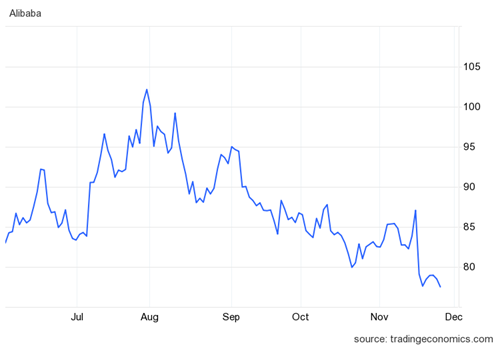
With just over four weeks of the year remaining, the MSCI China Index is poised to post its third straight annual loss1. Property sector woes, a slower-than-expected consumption rebound post-Covid, and a supply chain rejig resulting in ‘nearshoring’ have combined to make China a no-go area for some. Increased negative sentiment surrounding the region has birthed ‘emerging markets ex-China’ products as some commentators have declared the region is uninvestable.
The past few years have involved significant geopolitical tensions globally. Fears that China could invade Taiwan and trigger a Russia-like exclusion from global markets have deterred potential investors. In addition to this, the region has also seen outflows after Covid restrictions were removed and the promised pent up consumer demand did not materialise as quickly as expected. Consumers have remained cautious and are postponing large expenditures like homes, cars and travel.
China's property market also hit turbulence as Evergrande and many other property developers defaulted on their debts. Investor confidence has also been impacted by the tough regulatory environment in China. Many businesses have been accused of monopolistic or uncompetitive behaviour and punished severely. DiDi (an Uber-like service in China) was banned for 18 months from app stores after a huge fine years previously related to a breach in data security and privacy laws. The suspension of Alibaba’s Ant Group IPO in 2020 and Jack Ma’s disappearance also served as deterrents for investors. Ma was missing for over a year after the technology sector crackdown, which was seen by some commentators as further evidence that he had fallen foul of the Chinese Communist Party for becoming outspoken and too powerful.
Alibaba has been back in the headlines over the past few weeks as the Chinese e-commerce business announced it would not spin off its cloud operations unit as planned and that they would halt the listing of its supermarket – which investors had been banking on.
After reporting lacklustre Q3 earnings the group said it had cancelled plans to pursue a separate initial public offering for its cloud business, citing “uncertainties” arising from US export controls on chips used in artificial intelligence. Alibaba also said it had put listing plans for its grocery chain Freshippo on hold. The share price fell dramatically in response.

Source: Trading Economics (27th November 2023)
Initially, the plan to split the business into various units was warmly received by investors in March but since then investor appetite has waned. Significant shareholders have reduced or sold stakes completely over the year. SoftBank Group, which once owned a third of Alibaba, sold most of its stake, and Ma, who used to lead the company, also announced plans to trim his remaining holding. Without a large shareholder left, many are wondering who will continue to support the business through its restructuring. While Ma is no longer actively involved in Alibaba’s operations, his decision to sell is a stark reminder that the firm doesn’t have a controlling shareholder at the top, just when significant spending will be required to rebuild and move into new fields such as generative AI. Although the regulatory landscape may be hard to navigate, Ma has not been deterred from being a business owner in China. His new venture ‘Ma’s Kitchen’ is focused on selling pre-packaged food and, despite there being few details available currently, the setup has prompted speculation that Ma may be hoping to benefit from the shift in consumption habits to ready meals2.
While China faces many negative forces surrounding geopolitical uncertainty, potential deflation and an unstable property market, we must also acknowledge that it is a market leader in terms of technology including electric vehicle adoption, has a population of over 1 billion people, and is trading on much lower valuations than other major economies.
With a number of concerns surrounding China and no crystal ball, we adopt a balanced approach by not owning region-specific funds, instead gaining exposure through broader global emerging market funds that can diversify into various countries and sectors.
Sources:
- 1 FE Analytics
- 2 CNN Business

